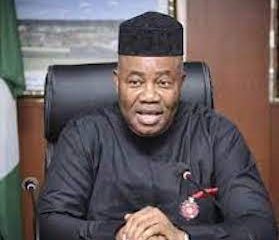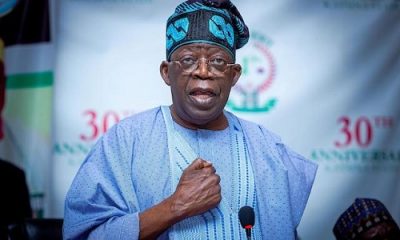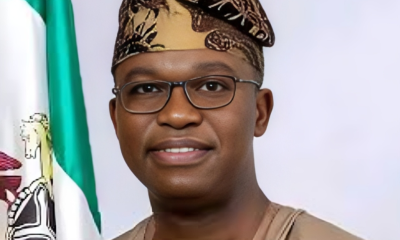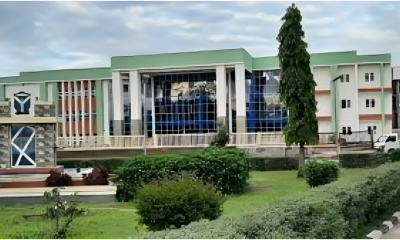OPINION
Natsaha Akpoti-Uduaghan : Beauty, Brains, Brawn on Eve of 44

By Tunde Olusunle
She was a breath of fresh air when she joined the political fray in Kogi State. She’s an attorney who is reputed for her efforts in advocacy. She is also a multitasking entrepreneur and dedicated philanthropist. She certainly was not the first woman to aspire to elective office in the “confluence state,” an alias which derives from the convergence of Nigeria’s largest two rivers in the capital of her state.
She came, however, with distinctive flair, style, guts, grit and elocution. The trademark veil over her head re-echoes memories of the iconic former Pakistani Prime Minister, Benazair Bhutto. Like Bhutto, Natasha Akpoti-Uduaghan is cerebral, self-confident, articulate, charismatic and strong-willed. Recall she outrightly rejected the congratulatory message of Yahaya Bello, outgoing governor of Kogi State, after she floored Sadiku Ohere, the former’s candidate for the Kogi Central senatorial seat at the appellate court weeks ago. Akpoti-Uduaghan alluded to attempts on her life by Bello’s henchmen in the run-up to the February 25, 2023 general elections. On that occasion, she ran for the Senate on the platform of the Peoples’ Democratic Party, (PDP), against Bello’s candidate, Ohere, who contested on the banner of the All Progressives Congress, (APC).Akpoti-Uduaghan started out years ago as a member of the APC in Kogi State. She aspired for the governorship ticket of the party in the lead up to the 2019 poll to no avail. Frozen out of the APC scheme, she moved over to the Social Democratic Party, (SDP), and made serious waves on her campaign outings. As she prepared to launch out on her second political advent and participation in the 2023 polls, Bello, according to Akpoti-Uduaghan, offered her the sum of N50million to jettison her ambition. She turned it down without batting an eyelid. She was similarly unimpressed with Bello’s increment of his offer to N70million. She told him she was not in politics for primitive fiscal acquisition, but was driven by a genuine conviction to serve her people. Bello, she confirmed, was furious at her unbending resolve.
And so she was back again on the campaign dais like the proverbial phoenix ahead of the 2023 political cycle. The proverbial ram in Yoruba folklore which took a few steps backwards in a contest with its challenger did not back out of the duel out of cowardice. No. It retreated to gather more steam and velocity to fight more pointedly and more determinedly. Akpoti-Uduaghan undertook due diligence about the most appropriate political vehicle to help the actualization of her quest. Despite efforts to annihilate the PDP at all levels by the incumbent APC, she was convinced that that party would serve her purposes. And so, she was on the road again, repeatedly touring the five local government areas in her senatorial district and spreading the gospel of the kind of impact she would bring to bear on her people if voted into office. She severally toured Adavi, Ajaokuta, Okehi, Okene and Ogori-Magongo council areas within her senatorial catchment sensitising her people and requesting their support for her bid.
The APC was paranoid on the eve of the February election on account of Akpoti-Uduaghan’s ever rising political profile. Totally bereft of ideas about how to stop the rampaging amazon, agents of the APC excavated all three accesses to the PDP senatorial candidate’s home. The idea was to prevent electoral officials from reaching her community and its environs, with the aim of disenfranchising that critical constituency in the poll. Akpoti-Uduaghan also noted that that orchestrated action could compromise her personal security and the safety of her people in the event that they had emergencies. Bello would thereafter concur to the act, saying the action was taken in the PDP senatorial candidate’s best interests, to prevent intending terrorists from attacking her on the eve of the election, a most unintelligent alibi.
After the senatorial election of Saturday February 25, 2023, the Independent National Electoral Commission, (INEC), declared Abubakar Sadiku Ohere of the APC as winner of the contest. INEC’s Returning Officer for Kogi Central, Rotimi Ajayi, a professor at the Federal University Lokoja, (FUL), stated that Ohere garnered 52,132 votes, while Akpoti-Uduaghan secured 51,763 votes. Ohere was thereafter issued a Certificate of Return by INEC and sworn in as a Member of the 10th Senate early June 2023. Undaunted and dogged, Akpoti-Uduaghan promptly sought justice at the Election Petitions Tribunal.
September 6, 2023, the tribunal ruled that the PDP candidate was the rightful and authentic winner of the contest. Akpoti-Uduaghan actually polled 54,074 votes, as against Ohere’s 51,291 votes. The judges observed that results from “nine polling units in Ajaokuta local government area, were inflated, while the votes of Akpoti-Uduaghan were intentionally reduced by INEC ward collation officers.” Dissatisfied and prodded by his principal, Ohere proceeded to the Court of Appeal for further adjudication. Tuesday October 31, the court dismissed Ohere’s appeal as “lacking in merit.” It declared Natasha Akpoti-Uduaghan as the “duly elected candidate for the Kogi Central senatorial election held in February 2023.” She was inaugurated as senator Thursday November 2, 2023, at a ceremony held during plenary, under the supervision of Godswill Akpabio, President of the Senate. She made history as the first female senator from Kogi State. Instructively too, she effectively dilutes the preceding Kogi all APC-cast in the senate of the federal republic.
Natasha Hadiza Akpoti-Uduaghan was born December 9, 1979, in Ilorin, Kwara State, to Jimoh Abdul Akpoti and Ludmila Kravchenko, a Ukrainian. Abdul Akpoti who hailed from Obeiba-Ihima, Okehi LGA in Kogi State, met his wife while training as a medical doctor in the Eastern European country of Ukraine, several decades ago. A “home girl,” she was educated at Christ the King Nursery and Primary School, Okene; Government Girls Unity School, Oboroke, and the Federal Government College, Idoani, Ondo State. She demonstrated leadership potentials even as a young girl, and was the “Head Girl” in her final year in secondary school. She was serially acknowledged as quiet, hardworking, disciplined and diligent, and always posted sterling academic performances. She studied law at the University of Abuja, enduring an intricate balance between her academics and early motherhood having gotten married at the tender age of 19. Her first son, Daniel was born within the period.
She attended the Nigerian Law School, Bwari, Abuja beginning from 2004, and was called to the Bar November 2005. She obtained a masters in business administration from the University of Dundee, Scotland, in 2012. She previously served as legal counsel at the Brass Liquefied Natural Gas, (LNG) complex during which she travelled expensively across the world. Akpoti-Uduaghan has acquired pluri-dimensional competencies in management, mediation, leadership and arbitration among others. Her soft, humane side has been influenced considerably by her father’s selflessness and generosity. He was famous for treating many of his patients free in the course of his private medical practice unconcerned about profit-making.
On Saturday March 5, 2022, Natasha Akpoti got wedded to the Itsekiri billionaire, Emmanuel Oritsejolomi Uduaghan, the *Alema of Warri.* The event took place in Akpoti-Uduaghan’s primordial homestead in Ebiraland, Kogi State. The chief host was the recently departed *Ohinoyi of Ebiraland,* His Majesty, Ado Ibrahim. It was chaired by a former governor of Edo State, John Odigie-Oyegun, who also previously chaired the APC at the national level. Dignitaries at the high octane event included: Bukola Saraki, former Senate President; the *Olu of Warri,* His Majesty Tsola Emiko; the groom’s cousins and former governors of Delta State, James Ibori and Emmanuel Ewetan Uduaghan. Former Delta State governor, Ifeanyi Okowa; incumbent Senate President, Godswill Akpabio; former PDP Chairman, Iyorchia Ayu, among several dignitaries, honoured the event.
Akpoti-Uduaghan’s first contribution on the floor of the Senate was to request that the recently departed Ohinoyi of Ebiraland, Ado Ibrahim be immortalised. She spoke of his disposition as an urbane father and patriarch, and an apostle of peace all through his 25-year reign. Within the period, his sociocultural domain witnessed some physical development. She canvassed the rechristening of the Federal College of Education, (FCE), Okene, after the transited royal. Akpoti-Uduaghan was recently named Senate Committee Chairman on Local Content as replacement for her former sparring partner, Ohere. She was concurrently appointed Vice Chairman of the Committee on Steel. That she is in leadership positions in both very important committees, attests to her qualities and capabilities. Akpoti-Uduaghan’s advocacy for the resuscitation of the moribund Ajaokuta Steel Project located in Kogi Central, her primary sphere of representation, will gain desired traction, courtesy of her placements in the upper parliament.
The multibillion dollar complex has been emblematic of abandonment, waste, greed, graft, mismanagement in the past four decades now. Akpoti-Uduaghan grew up in Ebiraland and is fully cognisant of the humongous resources in foreign exchange previously sunk into the project which, nonetheless, has remained dysfunctional. The decrepit, melancholy-eliciting condition of the sprawling steel city is best appreciated via a drive through the gargantuan, multidimensional “steel city” of Ajaokuta. Akpoti-Uduaghan wants to proceed beyond preceding peripherals and platitudes to add breadth to the strident advocacy for the functional resuscitation of the octopoidal complex. It is very close to her heart because of its potential to sustainably impact the economy of her people, her state and Nigeria at large.
Tunde Olusunle, PhD, poet, journalist, scholar and author, is a Fellow of the Association of Nigerian Authors, (FANA)
OPINION
The Mokwa Tragedy
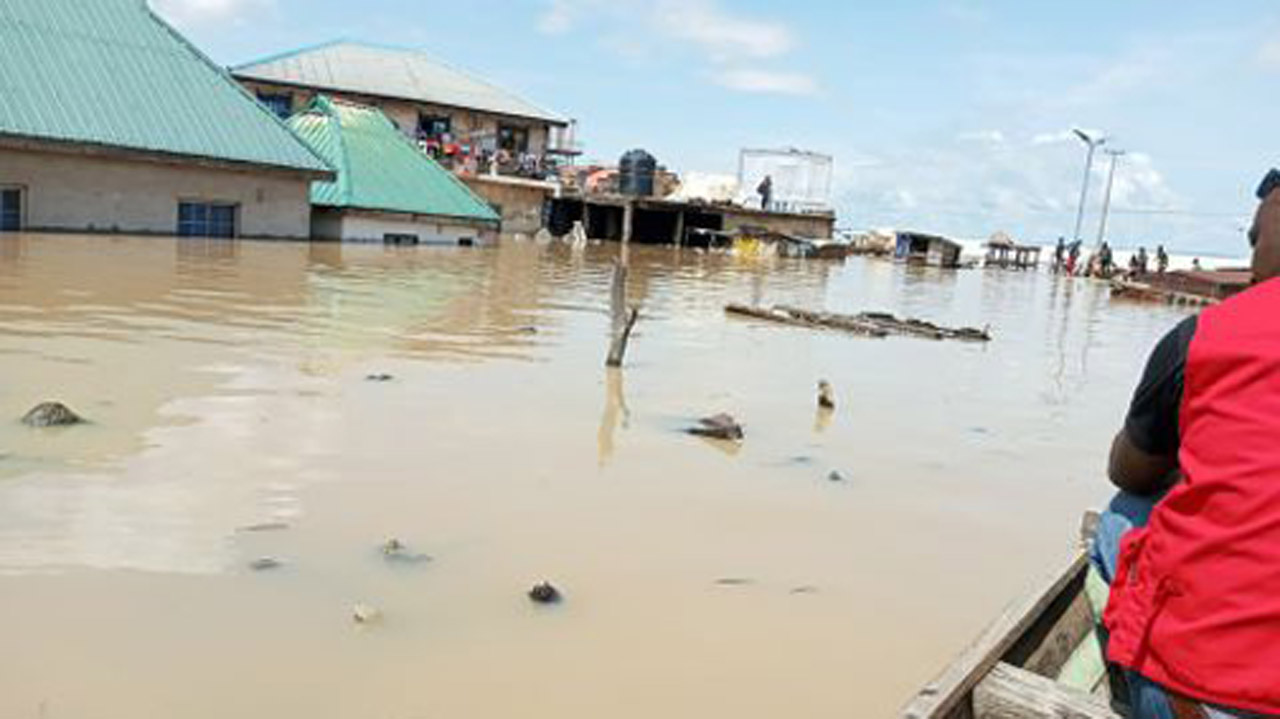
By Zayd Ibn Isah
There are calamities so devastating that in their aftermath, they ought to bring a nation to a halt, inspiring somber moments that should pierce through the noise of our politics, our tribal squabbles, and our digital distractions.These are the sort of tragedies that should unite people in a collective sense of grief, shock and loss.
The recent flood in Mokwa, Niger State, where raging waters swept away hundreds of men, women, and children, is one such tragedy. Unfortunately, this is the second major disaster to hit Niger State this year. Earlier, a fuel-laden tanker overturned, and instead of fleeing from the highly flammable spill, nearby residents rushed to have a fair share of the liquid black gold.The inevitable explosion that followed is estimated to have killed nearly a hundred people. Just as the nation was still reeling from that terrible tragedy, Mokwa was plunged into even greater sorrow. According to recent statistics reported by Daily Trust, over 200 lives have been lost in the recent flood, and around 500 people remain missing.Beyond lives lost, this particular flooding has displaced thousands, destroyed properties and placed many in severe financial ruin.Sadly, disasters like this are not new to us. From the Ogunpa flood in Ibadan in 1980 that claimed more than 200 lives, to the catastrophic floods of 2012 that affected 30 of Nigeria’s 36 states and displaced over two million people, to the recent floods in Borno, where waters from the Dam left destruction in their wake, a clearly predictable pattern seems to constantly emerge, especially when the rainy season comes.Nigeria has become painfully familiar with the sight of submerged communities, displaced families, and dreams washed away. What makes these disasters particularly heartbreaking is not just their frequency, but how preventable they often are.Yes, climate change is real. Rainfall patterns are shifting, and rivers are swelling beyond their historical bounds. But we must also confront an uncomfortable truth: we are not entirely innocent victims of nature’s fury.Across Nigeria, it is disturbingly common to see houses, shops, and even schools built on floodplains and natural waterways. Rivers are choked by illegal settlements, often constructed without proper approval or in blatant disregard of environmental laws.Yet, when government agencies move to demolish these structures, we cry foul. We accuse them of ethnic bias, political witch-hunts, or insensitivity. We shout “persecution,” when the real culprit is our collective refusal to listen to reason.Mokwa is a painful reminder of what happens when planning is ignored and nature is provoked. Urban planning in Nigeria is in crisis, not merely because government agencies fail to enforce regulations, but because we, the people, treat these rules with contempt.We bribe our way through approvals, circumvent safety protocols, and then feign surprise when disaster strikes. But floods don’t negotiate. They also certainly don’t recognise tribe, religion, or political affiliation. They simply follow the laws of nature. And if we insist on living in their path, the consequences, however tragic, are entirely avoidable.We must recognise that lives are at stake and that for survivors, the process of trying to rebuild or relocate while dealing with grief and loss, is often a difficult experience. This is why we must begin to change the way we talk about demolition and enforcement. The government is not your enemy when it clears structures built on waterways.On the contrary, such actions, when carried out transparently and justly, are lifesaving. We must stop romanticising illegal construction as a symbol of resilience. More often than not, it is a death sentence in disguise.That said, this is not the time to trade blame. It is the time to chart a new course. Flooding is not just a Nigerian problem. It is a global emergency. In recent months, Germany and Belgium were overwhelmed by deadly flash floods that claimed hundreds of lives. Brazil witnessed entire communities buried under mudslides triggered by torrential rains.In Bangladesh and India, millions were displaced after rivers burst their banks. Even the United States, despite its infrastructure, has seen cities like Houston and New York struggle to cope with overwhelming rainfall.In many of these countries, governments responded decisively; issuing timely evacuation orders, mobilizing rescue operations, and, crucially, relocating people from high-risk zones.In Japan and the Philippines, public education on disaster preparedness is rigorous and widely embraced. In the Netherlands, the government has invested heavily in flood defenses like levees, water plazas, and adaptive urban design.But here in Nigeria, even when relevant government agencies issue warnings, or evacuation is proposed, people resist. Sometimes it’s the deep emotional bond we have with our ancestral land. Other times, it’s the justified fear that relocation means abandonment, that once we leave, no one will remember us. And often, it’s simply that we have nowhere else to go.Yet we must acknowledge a timeless truth: prevention is better than cure. A stitch in time saves nine. As such, we need long-term solutions: proper drainage systems, enforced building codes, updated flood risk maps, and continuous public education on environmental responsibility.But beyond all that, we need a cultural shift, a collective understanding that human life is more valuable than temporary shelter, and that following the law is not a punishment, but a protection.The tragedy in Mokwa must not become just another headline. It must be a turning point. We should not just fall back on “thoughts and prayers”, lamentations, and vague promises to offer relief to victims. Rather, this should spur us all to insist on strict environmental and infrastructural maintenance, as well as effective measures for disaster preparedness, particularly when imminent disasters are as a result of climate change.We need to plan the development of our cities better, especially when it comes to constructing and maintaining proper drainage channels, managing waste disposal and ensuring that waterways are not impeded by illegal structures. We also need to be united in ensuring this becomes a national moment of reckoning, especially one where we begin to rethink how we live with our environment, and with one another.If we continue to build on water, water will continue to subject us to the terrifying laws of nature.Zayd Ibn Isah can be reached at lawcadet1@gmail.comOPINION
Nigeria’s Security: Between Self-defence and Community Policing

By Mukhtar Ya’u Madobi
As Nigeria continues to battle worsening security challenges — ranging from banditry and kidnapping to terrorism, insurgency, and communal violence — citizens across the country are increasingly embracing grassroots security measures and calls for self-defence.
These challenges are not confined to the North. In the South, militancy, piracy, secessionist agitations, cultism, and cybercrimes further complicate the nation’s fragile security landscape. Speaking at the maiden annual lecture of the National Association of the Institute for Security Studies, themed “Mobilising Stakeholders to Curb Insecurity in Nigeria: A Practical Approach,” the Director-General of the State Security Service (SSS), Oluwatosin Ajayi, stressed the need for communities to take greater responsibility for their own security. He cited examples where local populations had historically repelled insurgents and urged communities to work closely with security agencies to counter threats such as terrorism, banditry, and kidnapping.Ajayi noted that it is unrealistic to expect security agencies to protect every citizen across Nigeria’s expansive territory. He argued that communities must serve as the first line of defence, and that empowering them would enhance grassroots resilience, while reducing over-reliance on federal forces.Echoing this position, former Chief of Defence Staff, General TY Danjuma (rtd), recently renewed his longstanding call for Nigerians to rise in self-defence against non-state actors. Reacting to fresh waves of violence in Plateau, Benue, and other states, Danjuma insisted that citizens can no longer afford to remain passive while bandits and terrorists wreak havoc.“The warning I gave years ago remains valid. Nigerians must rise and defend themselves. The government alone cannot protect us,” he said.This message of self-defence has increasingly resonated across vulnerable communities, reflecting the harsh reality of an overstretched security system that leaves millions exposed. The roots of the crisis lie in decades of state neglect, porous borders, weak intelligence systems, and economic exclusion.In the North-West, states such as Zamfara, Katsina, and Kaduna are under the siege of bandits, who raid villages, rustle livestock, extort ransoms, and impose levies. In the North-Central region, particularly Plateau and Benue states, farmer-herder conflicts have morphed into sustained ethno-religious violence. The South-East contends with secessionist violence linked to IPOB/ESN elements, who often target security infrastructure. Meanwhile, the South-West and South-South struggle with cultism, ritual killings, and piracy.One chilling episode was the abduction of more than 280 schoolchildren in Kuriga, Kaduna State, in March 2024. Although the children were eventually rescued, the incident laid bare the glaring weaknesses in Nigeria’s security infrastructure and left the community traumatised.Faced with these realities, several states have begun taking their destinies into their hands. In April, the Kano State Government passed the Security Neighbourhood Watch Law to create a legal framework for community-led security efforts. Katsina has trained local vigilantes through its Community Watch Corps, while in Zamfara, Governor Dauda Lawal launched the Community Protection Guards (CPG), a controversial but welcomed initiative in rural areas long neglected by formal forces.In the North-East, the Civilian Joint Task Force (CJTF) continues to support military efforts against Boko Haram, leveraging local knowledge and swift response capabilities. The Amotekun Corps in the South-West, headquartered in Ondo State, has addressed critical security gaps in the region, earning both criticism and praise. Similarly, the South-East’s Ebube Agu and joint regional outfits in the South-South emerged from the growing public distrust in the federal government’s ability to guarantee safety.However, the growing wave of self-defence and vigilante initiatives raises ethical, legal, and practical concerns. Nigeria’s Firearms Act prohibits civilians from bearing arms without a licence. Without a clear regulatory framework, arming civilians risks escalating violence, enabling political thuggery, and creating new security threats under the guise of protection.These dangers are not hypothetical. In Edo State’s Uromi community, vigilantes wrongfully accused 16 Northern hunters of being kidnappers and burnt them alive. In July 2022, Ebube Agu operatives reportedly killed 14 unarmed wedding guests in Otulu, Imo State. Other vigilante groups in the region have been implicated in extrajudicial killings and abuses. A Daily Trust investigation in April revealed that vigilante groups killed at least 68 people in three months, with many more subjected to torture, harassment, or unlawful detention.These developments have prompted the House of Representatives Committee on Army to call for the regulation, oversight, and training of vigilante groups. The Uromi killings, in particular, triggered national outrage and renewed demands for accountability.Responding to these concerns, Major General Chris Olukolade (rtd), chairman of the Centre for Crisis Communication, acknowledged General Danjuma’s fears but cautioned against unregulated civilian self-defence. He warned that unless communities are engaged within a structured and legal framework, insecurity may only worsen. According to him, civilians should not be armed unless integrated into formal security systems with clear guidelines.Against this backdrop, community policing has emerged as a more sustainable and coordinated alternative. Under the leadership of the Inspector General of Police, pilot schemes have been launched across several states. These involve recruiting and training locals for surveillance, intelligence gathering, and early intervention, followed by their integration into existing police structures.Lagos, Ekiti, and Kano States have all recorded notable progress. In Kano, the Hisbah Corps, initially tasked with moral enforcement, has been reoriented to contribute to broader urban security. In Lagos, the Neighbourhood Safety Corps plays a vital role in gathering intelligence and issuing early warnings.Nonetheless, community policing faces serious limitations. Funding shortfalls, inter-agency rivalries, and a lack of coordination continue to undermine its effectiveness. A major stumbling block is the constitutional contradiction where state governors are designated as chief security officers but lack control over federal police operations within their jurisdictions.Solving Nigeria’s security crisis requires a comprehensive strategy that addresses institutional, legal, and socio-economic issues. First, the constitution must be amended to empower state and community policing structures with defined jurisdictions and robust oversight. Second, vigilante and self-defence groups must be trained, regulated, and integrated into the formal security architecture to avoid becoming a threat themselves. Third, intelligence gathering should begin at the grassroots, where community members are often the first to notice early warning signs. Fourth, addressing the root causes of insecurity — such as unemployment, poverty, and youth disenfranchisement — through investments in education, job creation, and social empowerment is essential. Lastly, traditional and religious leaders must be given formal roles in mediation, peacebuilding, and community-based conflict resolution, given their influence and trust within local populations.Nigeria’s security challenges demand more than rhetoric and reactive responses. While the instinct to defend oneself is natural in the face of government failure, unregulated self-defence is a risky and unsustainable path. The lasting solution lies in creating a decentralised, community-driven security model rooted in legality, ethics, and shared responsibility.As communities across the country face mounting threats, the question is no longer whether to adopt localised security strategies — but how best to coordinate, empower, and regulate them before chaos becomes the norm.Mukhtar Ya’u Madobi is a research fellow at the Centre for Crisis Communication. He can be reached via ymukhtar944@gmail.com.
OPINION
This Trial of Oloyede
By Tunde Akanni
It’s been traumatic for my entire family since that video started making the rounds. I sneaked a slight view… It’s our trial. It’s my trial. Oloyede is genuine. He is most sincere. He is modestly so, as well. For us, however, Allah knows best.
I was with a trader in the afternoon of what I considered a dark Wednesday, the 14th of May. “Se bi won ni JAMB o get mo bayi…”. I had to cut in immediately. Which JAMB? “Madam, that’s one person I will vouch, and vouch for…zero tolerance for corruption. Absolutely responsible with a high level of consciousness for the good of others. If certain things went wrong at JAMB, I agree it’s his responsibility to carry all pleasant and other burdens but just know that the bad side of the operations may as well be sabotage. I have absolute trust in that man. Ask my own colleagues about me, but Oloyede is my own hero, somebody I have known for more than 40 years…”This is by no means a reductionist disposition to the tragedy induced by the so-called computer glitch. May the Almighty God in His infinite mercy console the parents of the candidate reported to have committed suicide. May God strengthen them to survive this gloomy phase of their lives and sustain them to reap bountiful compensation that will endure in their lives. It’s hard, so hard to pull tragedies of this magnitude. I personally feel for these parents.The said computer glitch, may we never fall victim to it. Those who work for big organisations requiring a large layout of ICT operations know what I’m talking about. Rather than being ‘solutional’, IT facilities can be unimaginably problematic sometimes, yet indispensable in this civilisational dispensation. This is not doubting deliberate sabotage, as may have happened in the case of JAMB. I’ve been part of Oloyede’s JAMB journey to attest to his commitment to offer his best for the otherwise sinking board.Far from being cosmetically exhibitionist, the Oloyede-led JAMB team, led by the Education minister, Tunji Alausa, went round the critical facilities of JAMB during the just concluded examination. Alausa saw, firsthand, like never before elsewhere in this country, how far JAMB had gone in its strive for transparency and the real-time monitoring of the conduct of examinations nationwide. Alausa, beyond being in awe, sought to make the JAMB effect spread immediately to other examination bodies.No be dem say, same day, the WAEC team came to JAMB and made it into the situation room, which was my own duty post. The NECO team followed suit afterwards, both duly led around by the sturdy lead IT consultant who’s been reliably there from Oloyede’s assumption of duty, Damilola Bamiro. Far richer, given that they charge more for their exams, the duo of WAEC and NECO were suddenly mandated to understudy the examination sector leader in Africa that JAMB has become over time.The staff of both WAEC and NECO suddenly had to undertake a professional excursion led through all the real time monitoring screens and other digital facilities. It was obvious they marvelled at what they saw, revealing a functional leader-subordinate synergy manifest with trendy output that the world can see and learn from.But that may even seem like the tip of the iceberg of the output of the hard work and commitment of the nation’s foremost icon of integrity in public service. A series of far more seemingly serious strides had been accomplished by Oloyede at JAMB. As a focused scholar, he keeps ensuring that every bit of the experience of the Board is treasured as worthy data to guide future actions and even subjects for further research.Not even the agencies dedicated to emergency matters in Nigeria could have been as prompt as the Oloyede management on this ugly glitch saga. Once the complainants began ventilating into the public space, JAMB rose to the challenge without any predictably traditional arrogant stance of government is always right. I was aware that a particularly strident public critic and a former students’ leader at Obafemi Awolowo University, Adeola Soetan commended the spokesperson for JAMB for the excellent handling of public complaints.Promptly, an independent team of investigators was set up to unravel the mystery leading to the rather depressing situation that now confronts us. The team, drawn from assorted but technically relevant constituencies, has found out that no fewer than 165 centres of over 800 examination centres nationwide were affected.Obviously well prepared for whatever the outcome may turn out to be, he braced up to the challenge to embrace the surrender value to tell it to the world as it is. This trial is for all of us who believe and trust Oloyede. I am in this group. So much so that his public cry infected me…It was a patriot’s cry for his beloved country. Like me, a former Law don at LASU, Dr Kilani wasn’t any less affected as demonstrated in a quick note to me: “I write to associate myself with the pain, sorrow and emotion of our own Professor Oloyede. I could not hold my tears seeing him cry. May Almighty Allah see him through. May we all not be put to shame…”But then came a soothing message from Gbade Osunsoko, my cousin: “…He will come out of this much stronger because Nigerians will trust him far better than a number of our leaders.. A man that makes mistakes happens under him and takes responsibility – it’s a big deal in Nigeria.”With Oloyede, young Nigerians with challenges regarding sight are no longer left to moan their fate endlessly, with adequate provision for their inclusion in the UTME. How many of our public facilities are this inclusion conscious as stipulated by SDGs? How come a legacy built through almost a decade at the very best cost ever possible will be made to crumble when the game changer leader remains ever modest? JAMB has steadily risen through thick and thin to accomplish its tasks to the admiration of stakeholders, nationally and internationally, under Oloyede. Both NNPC and the Nigeria Police, being beneficiaries, can attest to the current competence of JAMB. How many other numerous stakeholders nationwide never deemed to have any relevance to JAMB before Oloyede but have since become critical, if not indispensable players?But why does this sudden saddening encounter threaten our joy of service without blemish? Why this unforeseen truncation of a good story, so intentional, coming from Africa? Whodunnit? Surely the truth shall come out for the world to perceive and assess and get to appreciate the efforts and the quantum of commitment appropriated to the JAMB excellence project driven by Oloyede.One cannot but be deeply concerned. Before the very eyes of a few of us carefully selected to give support from our respective professional perspectives from the very beginning, Professor Oloyede’s concern for genuine growth and development was real. It is still real and increasingly so, as a matter of fact. Indeed, inimitable. It shall be well.Tunde Akanni is a professor of Journalism and Development Communications at the Lagos State University, LASU. Follow him on X:@AkintundeAkanni

